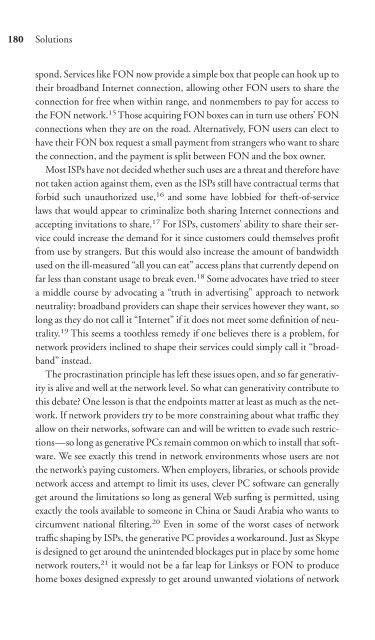Download - Future of the Internet â And how to stop it.
Download - Future of the Internet â And how to stop it.
Download - Future of the Internet â And how to stop it.
Create successful ePaper yourself
Turn your PDF publications into a flip-book with our unique Google optimized e-Paper software.
180<br />
Solutions<br />
spond. Services like FON now provide a simple box that people can hook up <strong>to</strong><br />
<strong>the</strong>ir broadband <strong>Internet</strong> connection, allowing o<strong>the</strong>r FON users <strong>to</strong> share <strong>the</strong><br />
connection for free when w<strong>it</strong>hin range, and nonmembers <strong>to</strong> pay for access <strong>to</strong><br />
<strong>the</strong> FON network. 15 Those acquiring FON boxes can in turn use o<strong>the</strong>rs’ FON<br />
connections when <strong>the</strong>y are on <strong>the</strong> road. Alternatively, FON users can elect <strong>to</strong><br />
have <strong>the</strong>ir FON box request a small payment from strangers who want <strong>to</strong> share<br />
<strong>the</strong> connection, and <strong>the</strong> payment is spl<strong>it</strong> between FON and <strong>the</strong> box owner.<br />
Most ISPs have not decided whe<strong>the</strong>r such uses are a threat and <strong>the</strong>refore have<br />
not taken action against <strong>the</strong>m, even as <strong>the</strong> ISPs still have contractual terms that<br />
forbid such unauthorized use, 16 and some have lobbied for <strong>the</strong>ft-<strong>of</strong>-service<br />
laws that would appear <strong>to</strong> criminalize both sharing <strong>Internet</strong> connections and<br />
accepting inv<strong>it</strong>ations <strong>to</strong> share. 17 For ISPs, cus<strong>to</strong>mers’ abil<strong>it</strong>y <strong>to</strong> share <strong>the</strong>ir service<br />
could increase <strong>the</strong> demand for <strong>it</strong> since cus<strong>to</strong>mers could <strong>the</strong>mselves pr<strong>of</strong><strong>it</strong><br />
from use by strangers. But this would also increase <strong>the</strong> amount <strong>of</strong> bandwidth<br />
used on <strong>the</strong> ill-measured “all you can eat” access plans that currently depend on<br />
far less than constant usage <strong>to</strong> break even. 18 Some advocates have tried <strong>to</strong> steer<br />
a middle course by advocating a “truth in advertising” approach <strong>to</strong> network<br />
neutral<strong>it</strong>y: broadband providers can shape <strong>the</strong>ir services <strong>how</strong>ever <strong>the</strong>y want, so<br />
long as <strong>the</strong>y do not call <strong>it</strong> “<strong>Internet</strong>” if <strong>it</strong> does not meet some defin<strong>it</strong>ion <strong>of</strong> neutral<strong>it</strong>y.<br />
19 This seems a <strong>to</strong>othless remedy if one believes <strong>the</strong>re is a problem, for<br />
network providers inclined <strong>to</strong> shape <strong>the</strong>ir services could simply call <strong>it</strong> “broadband”<br />
instead.<br />
The procrastination principle has left <strong>the</strong>se issues open, and so far generativ<strong>it</strong>y<br />
is alive and well at <strong>the</strong> network level. So what can generativ<strong>it</strong>y contribute <strong>to</strong><br />
this debate One lesson is that <strong>the</strong> endpoints matter at least as much as <strong>the</strong> network.<br />
If network providers try <strong>to</strong> be more constraining about what traffic <strong>the</strong>y<br />
allow on <strong>the</strong>ir networks, s<strong>of</strong>tware can and will be wr<strong>it</strong>ten <strong>to</strong> evade such restrictions—so<br />
long as generative PCs remain common on which <strong>to</strong> install that s<strong>of</strong>tware.<br />
We see exactly this trend in network environments whose users are not<br />
<strong>the</strong> network’s paying cus<strong>to</strong>mers. When employers, libraries, or schools provide<br />
network access and attempt <strong>to</strong> lim<strong>it</strong> <strong>it</strong>s uses, clever PC s<strong>of</strong>tware can generally<br />
get around <strong>the</strong> lim<strong>it</strong>ations so long as general Web surfing is perm<strong>it</strong>ted, using<br />
exactly <strong>the</strong> <strong>to</strong>ols available <strong>to</strong> someone in China or Saudi Arabia who wants <strong>to</strong><br />
circumvent national filtering. 20 Even in some <strong>of</strong> <strong>the</strong> worst cases <strong>of</strong> network<br />
traffic shaping by ISPs, <strong>the</strong> generative PC provides a workaround. Just as Skype<br />
is designed <strong>to</strong> get around <strong>the</strong> unintended blockages put in place by some home<br />
network routers, 21 <strong>it</strong> would not be a far leap for Linksys or FON <strong>to</strong> produce<br />
home boxes designed expressly <strong>to</strong> get around unwanted violations <strong>of</strong> network


